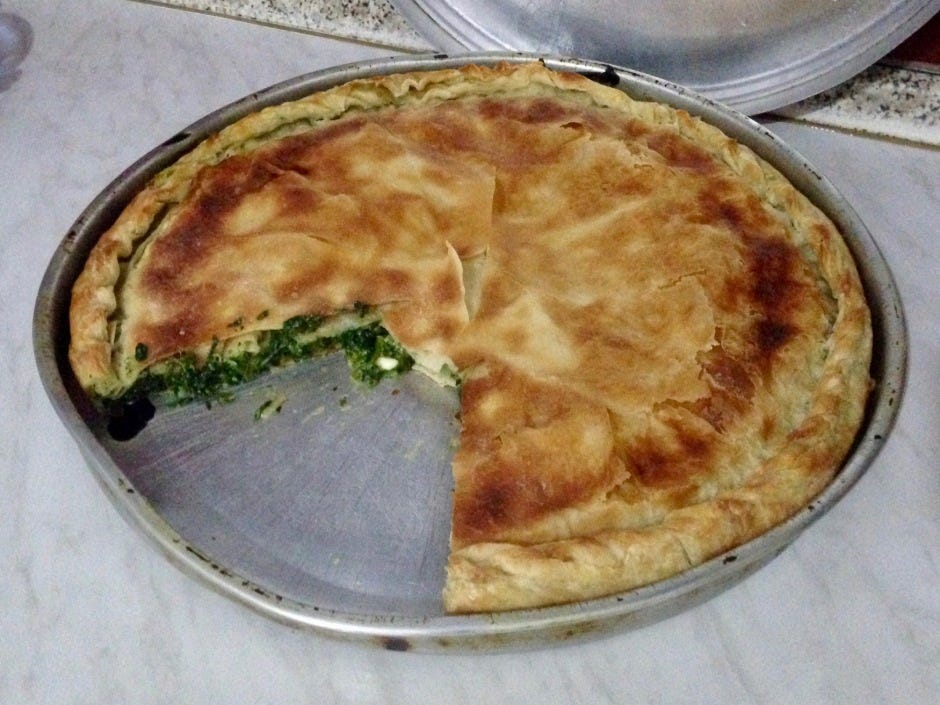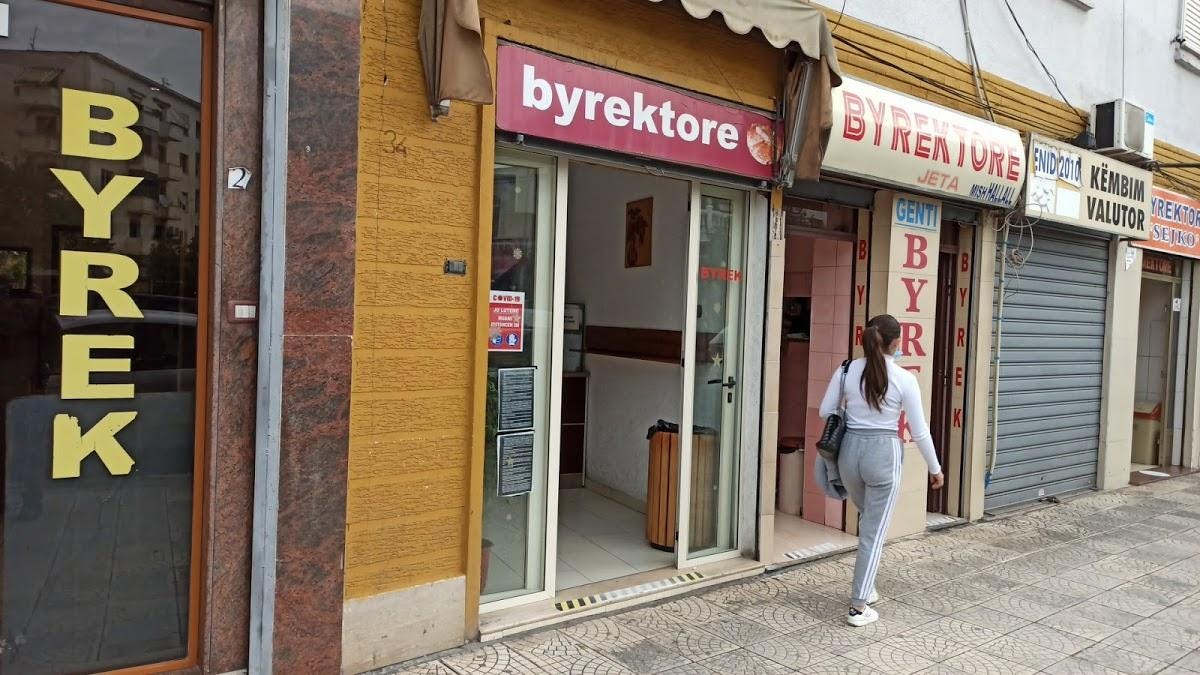I started writing my second novel, The Girl at the Byrektore, last year (more info on my first book can be found here).
Henry, a former advertising executive from the Big Apple, finds himself running from one woman's arms to another’s in Tirana, the capital of Albania. Delving deeper into Henry’s past and discovering the painful dissolution of his previous marriage and the tragedy that precipitated it, the reader starts questioning Henry’s every motive and who the man running an obscure call center in the Balkans truly is. The story follows his fascination with a particular girl who works at a byrektore near his office, and the slow yet steady deterioration of his relationship with his girlfriend, Elbona.
The American is relieved when a small white hatchback rattles past him - at least it isn’t an operator screeching into a headset. The road has deep ruts, the asphalt degraded by the elements and industry-strength trucks transport excavated minerals across the city.
It is almost seven o’clock and the sun is setting in the September skies. Its thin, ethereal light bathes the quiet street in an odd mixture of darkness and light.
He makes his way across the dirty sidewalk littered with aluminum Bellino! croissant wrappers and empty cigarette boxes.
The man strides in under a burgundy canopy and past the hard plastic of outdoor black chairs and wooden tables.
A girl inside the store is working. She looks almost like a teenager. He is sure she must be right out of high school. He feels slightly guilty for wanting her.
But mostly, he just wants to see her plain, inexpressive face.
The American smiles at the young girl, all white teeth and wide lips. It’s a smile brimming with desire and a fake warmth.
“Përshëndetje,” he doles out a hello. Or, maybe, it comes out: “Miremebrema,” good evening. He’s noticed people are more likely to use that one, and it seems to get him better responses.
Because Albanians never listen when the American starts to speak. That’s what he’s noticed. He knows his Albanian is terrible and that he needs to practice and improve, but he also knows when he says certain phrases and asks certain questions, like where the pharmacy is or how much the byrek me mish costs, he knows he’s saying it perfectly correctly, using the exact, correct words that his Albanian-language teacher, Jolinda, would have told him to use.

“Mirembrema,” she says in the exact same voice she’s used the past hundred times he has come into the byrektore. “Si jeni?”
She always uses the formal conjugation.
“Mirë, mirë, po ti? Si je?”
But they get so confused when they see a foreigner speaking their tongue. Like they’re expecting you to mumble something idiotic. Or, to speak English.
Not that he had said much. Half the language is mirë this, mirë that. As if everything is simple good and well and nice.
But how could he speak in English when he has tried so hard to pick up the language? When he has the words to tell her exactly what needs to be said?
“Keni sot byrek me mish?”
He likes the texture of the meat inside the byrek. It’s savory and salty and a little tangy. Like biting into a tiny hamburger wrapped in crispy dough sheets that go crunch in his mouth.
“Po,” she shakes her freckled head. Her eyes are still impassive and uninterested. If she recognizes the American, she makes no friendly smile, no nod of the head that says: oh, yes, you! You come here all the time! Nice to see you again.
Maybe the problem is that his words are correct. Or, too correct. Maybe he’s using the exact words a teacher would use but not the words an Albanian in the street would use. Maybe the problem is that he has tried to learn so hard how to pass as an Albanian in Tirana that he has failed to recognize that he could never be one.
“Dua një byrek me mish dhe një byrek me gjizë, te lutem,” he says in perfect Tirana dialect.
He almost winces as the girl nods and looks down at the warm glass case. It contains a variety of byreks, one mostly indistinguishable from its neighbor. Some are easy to identify once you start peering forward and sniffing.
There’s byrek me gjizë, the cheap, salty white cheese. It looks like a film of cottage cheese but is quite hard and salty.
Then there is the byrek with the sporadic, Hulk-green spots littering its exterior. Byrek me spinaq. Easy.
And then there are the mystery byreks. They put so little meat in the byrek me mish that he can’t tell if the closed one is indeed a meat-filled delight or might contain qepë dhe domate, onions and tomatoes. That’s another classic that always sends his taste buds reeling, floating high into the sky.

She starts to put the byrek in a small white paper to-go bag. The kinds used for croissants or byrek or kek, ubiquitous in Tirana, littering its streets and filling its trash cans.
“Do ulu këtu,” he informs her.
She looks up at him, surprised.
“Do ulush këtu?” she repeats after him, as if no one has ever said those words to her. As if he is unique, and she has never had a customer tell her, halfway to putting the byrek in the little white bag, that he would like to sit and enjoy his food here.
“There’s no way you can do that,” he imagines her saying. “There’s no way for you to sit here, because nobody ever sits here.”
Instead, she nods her head dutifully and looks down. She takes out a small red square plate from below the counter, places a napkin on it and empties the crumbly byrek onto it.
Crumbs litter the counter and plate now. If she had only asked him before, there wouldn’t be so many crumbs everywhere!
“Dhe sa është?”
He asks the final question he knows he can ask the girl before the conversation will end. If you can call it a conversation. The short, simple exchange of words that couldn’t even qualify as pleasantries, could not qualify as chit-chat, could simply be named: Man Orders Byrek.
“Një mijë e gjashtëqind,” she mutters, looking down again.
He finds her lack of engagement frustrating, the un-desire on her part to make eye contact or talk or interact with him beyond the simple interactions necessary for ordering, getting the byrek and paying for it borderline infuriating.
He scrambles through the outer pocket of his backpack, where he keeps his wallet. He knows he should have some coins. Most places accept only cash, and he has to keep a good chunk with him at all times, and not just bills but also small coins for cheap buys and byreks. Otherwise, the clerk will give him a mournful look, eyes full of concern and annoyance, and ask if he has smaller bills or coins.
He pauses mentally to repeat the words she’d said to him. Një mijë e gjashtëqind, one-thousand-six-hundred, which is one-hundred-sixty new lek. He doesn’t know why everyone keeps quoting old lek. It’s very confusing - on top of needing to remember the numbers and translating the prices in his mind, he also has to convert old lek to new, chopping off a zero and making sure he isn’t being ripped off.
“Hajde,” he says with that endearing tone he’s heard most Albanians deploy to end conversations. He doesn’t fully grasp why he says the word - it literally means ‘come,’ but Albanians seem to use it to say goodbye. He gives the woman a tan 200 lek bill.
She opens the cash register and pulls out four ten lek coins. He is relieved that he heard her correctly and gave her enough money. He has, in the past, misinterpreted things when thick-tongued clerks have told him the price: given too little money on his worst days, received back more change than he’d expected on better ones.
She has beautiful, light grey and hazel eyes. He wants to say more. She drops the coins into his open palm. Their hands don’t touch, and he finds his body tingling. He wants her fingertips to brush against his open palm. He wants more, he does not want to take the plate with two pieces of byrek and sit down at the table outside and stop having an excuse to speak to the beautiful girl.
He wants her to say “Nga je?” He wants her to deploy Albanian old-world charm, to be curious about this foreigner who has forayed, even for a few minutes, into her life. To invite him into her. For the corners of her mouth to tilt upwards just a little bit with a display of affection.
“Po?” she asks him, eyes wide open, earnest.
He realizes he has been standing there longer than appropriate without uttering a word. He has gotten so wrapped up in his thoughts that the American had forgotten he is standing alone in the byrektore with the clerk.
She is waiting for him to do something, anything.
“Nga je?” he asks.
He knows it is desperate, he knows he shouldn’t, he knows he is breaking every social code, and maybe she will think he is odd and needy. He is sure the young woman can positively smell the stench of his desire on him like a thick cologne sprayed on hastily before going out for a party.
“Unë jam nga Tiranë…”
Part two continues here:
The Girl at the Byrektore (continued)
This is the second half of the first chapter of my new novel, The Girl at the Byrektore. To read the first half, see my previous post.
I hope you enjoyed this snippet. Feel free to leave a comment or any feedback you might have.





Ugh I want more!!